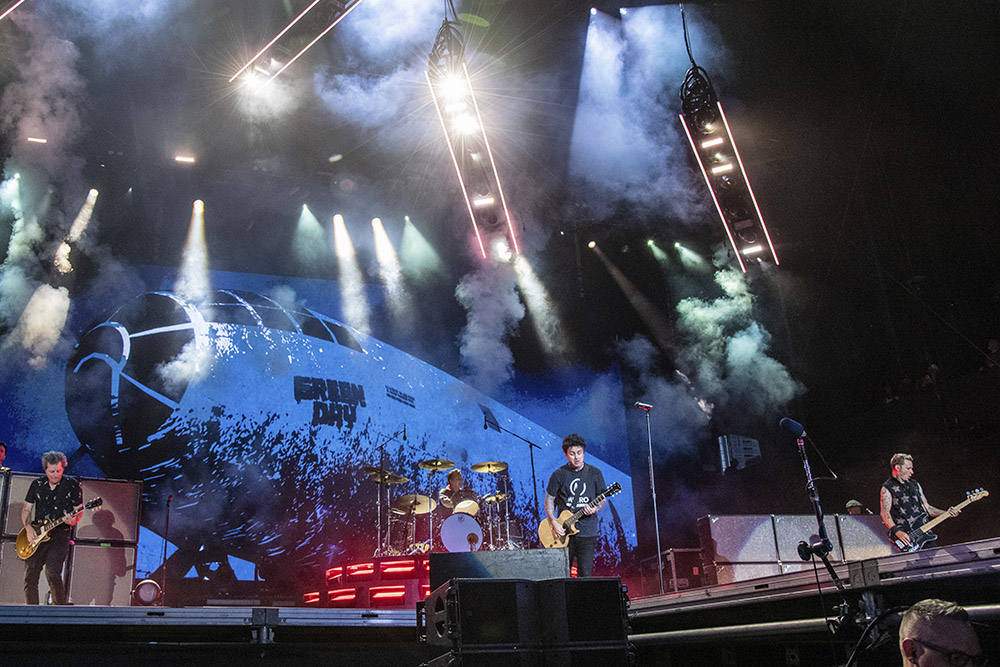
From left, Jason White, Billie Joe Armstrong, Tré Cool, and Mike Dirnt of Green Day perform on at the Lollapalooza Music Festival on July 31, 2022, at Grant Park in Chicago. (AP/Invision/Amy Harris)
"We are the last of the rockers, making a commotion," sings Billie Joe Armstrong on the title track of Green Day's new album, "Saviors."
And make a commotion they did, as the band took the New Year's Eve stage on national television and proudly changed the lyrics in their hit single "American Idiot" to announce that they were not "part of a MAGA agenda." (Armstrong has also been known to loudly and explicitly exclaim his disdain for Donald Trump during every performance of that song.)
Subtlety has not been a hallmark of Green Day's enduring international success. The band is known for their anthemic, loud, countercultural ballads that came to define the very sound of the early aughts. "American Idiot," their second-best-selling album, famously (and relentlessly) criticized then-President George Bush, the Iraq War and the societal malaise caused by rampant capitalism and consumerism.
That album was followed by "21st Century Breakdown," which was a total rebellion against the major institutions of society, with particular frustration toward the media and organized religion for failing to speak prophetically.
Advertisement
That's why it was curious that, just when the world arguably needed the prophetic voice of punk rock most, it went silent. Though they produced multiple studio albums right before and during the Trump presidency, Green Day seemed disengaged, perhaps even reluctant, to lend their voices to the fray.
Now, as the country and the world grapples with the potential of another Trump presidency — during which he has openly discussed "being a dictator on day one" — Green Day has returned, perhaps to be our saviors.
"The American Dream is Killing Me," which serves as both the album's first track and first single, paints a bleak and frightfully accurate picture of American society. "We are not well. Are we not well?" asks Armstrong, who goes on to highlight the epidemic of homelessness, the rejection of immigrants, and the commercialization of housing as betrayals of human dignity. The song feels like a sequel to "American Idiot" — one in which the prior song's warnings have proven true.
"Coma City" begs people to open their eyes to the systemic problems we face, announcing that we are "dead on arrival under smoky skies," which feels like a callback to the weeks of air quality problems and red skies that plagued much of the country last summer.
The song continues by calling out the hypocrisy of billionaires who "bankrupt the planet for a--holes in space," the police for not doing their jobs, and society as a whole for failing to address gun violence, "shooting in the distance, it's on your face and hands, with no resistance."
Then there's the one-two punch of "Strange Days Are Here to Stay" and "Living in the '20s," two songs that have an energetic, pop feel but dark, jarring lyrics.
"Strange Days" is a referendum on the absurdity of the times we are living in and is written from the perspective of someone who simply has resigned themselves to this bleak future: "Strange days are here to stay, everyone is racist, and the Uber is running late. I just lost my sense of humor, Gen-Z's killing baby boomers now."
"Living in the '20s" is a satirical take on the current American societal carnage: "Another shooting in a supermarket, I spent my money on a bloody, soft target," sings Armstrong, before he laments the era in which we are living in together: "Ain't that a kick in the head?"
But it's not just leaders and followers of far-right political movements that are subject to the ire of Green Day in the album. "Goodnight Adeline" seems to address the political moderate who is content to "drink my wine and let it go" and "1981" satirizes people's nostalgia for the good old days of the allegedly simpler times that instead featured the Cold War, "commies and cocaine."
Not every song exists to condemn the status quo, however. "Father to a Son" is a beautiful, emotional song that captures the urgency and desperate hope of parents raising children in this world. If ever there's hope in "Saviors," it is in this song, where the lyrics refer to the child as "a lighthouse in a storm, from the day you were born."
Perhaps that's why the title track "Saviors" follows this song, literally "calling all saviors tonight, make us believers tonight" — a last-ditch effort to fight our current cultural sickness, if, for nothing else, for the kids.
"Saviors" feels like the third installment in a trilogy with "American Idiot" and "21st Century Breakdown." If the thesis of "American Idiot" was "Is anyone else seeing this? This is not okay!" and the thesis of "21st Century Breakdown" was "Is somebody going to fix this? This is a mess!" then the thesis of "Saviors" is "Does it seriously need to be us? Fine!"
The album addresses the ills of modern society and the failure of institutions like the church and the government to speak out, but in the style of pop-punk that inspired a generation of Americans 20 years ago to rebel against the Iraq War and the Bush administration.
That generation, much like Green Day themselves, seems to know how challenged our world is, but apathy and nihilism have kept them on the sidelines — until now. Though the album title is undoubtedly meant in jest, there is a part of Green Day that truly does believe they, or punk rock, could be our saviors as we teeter on the edge of fascism or anarchy. And they just might be right.








